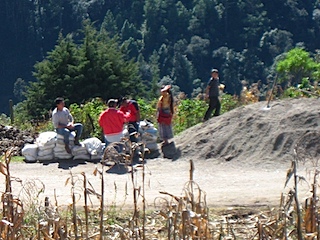As you all know, we’ve been trying for months to set up a SPA grant to help our village construct sanitary infrastructure. Although we’ve made occasional headway, things keep getting bogged down. Right before we left for Thanksgiving vacation, we had a big meeting to rally the leaders. They promised to do the homework I assigned them in the two weeks we were gone, so I returned with high hopes we could hit the ground running. But in the three weeks we’ve been back, it’s been hard to get anyone to talk to me about having a leaders’ meeting to see what’s been done. FInally, yesterday, I got Manuel in a corner and told him that we need to talk about this, because the absolute latest date we can submit the paperwork for this particular grant is 31 January. He agreed to set up a meeting for this afternoon, and call the leaders together.
So, this morning I went into town for an unrelated meeting (more on that later) and got back to the village at about noon. When I stepped off the microbus, I saw Nas Palas and Manuel hanging out on a big pile of gravel by the roadside, along with a guy we just call “drunk dude” because we’ve never seen him sober. They motioned me to come over, and when I got there they handed me a beer. This is a bad sign. The dozen or so empties in the field below them and their slurred speech were the next bad signs.
Now, I almost never drink with the locals. I am not a drinking guy, and it also can set a bad precedent. But in this case, I accepted the beer because it would have been impossibly rude not to. It’s an extension of the Mayan hospitality thing where they offer you food if they like you. “OK, but only one,” I told them. “It’s early, and I have a lot to do today.”
Nas seemed very pleased with that, and started rambling about various things, as drunk people do. At first, I was pretending to listen just to be polite. Then I sortof got sucked into the conversation, and realized that I was seeing a strange insight into part of the culture here. “We drink to remember, and we drink to forget,” he said. But it’s more than that. He also talked to me about how his two kids that just graduated high school, Galindo and Lucia, were going to leave, and how they needed to go to advanced school but he had no idea how he was going to pay for it.
“Wait,” I said. “Are you worried about them leaving, or the money? Or both?”
“Both!” he said emphatically, then rambled on some more about how Mayans are very poor, then about how the family name of Nas is really rare, and the only place you’ll find them is in this region north of Huehuetenango.
When I finished my beer, I thanked them for their hospitality and made my exit. They waved cheerfully as I left and then peed on the road, and I thought about what I’d just experienced. Drinking is a huge problem here, but I think it is symptomatic of a bigger problem. The men here have rigid roles that they’re shouldered with, and it’s hard for them to live up to the image sometimes. Nas worries about how to take care of his family, but society here prevents him from expressing these views to anyone, to get them off his chest. Drink is the only recourse he has. It’s especially bothersome for me, because I respect Nas more than anyone else here, but to see him drunk and useless makes me think less of him. I love the guy, and part of me wants him to be better than that. But he is who he is, and I need to realize that and make peace with it.
Also, as you might have guessed, the leaders meeting didn’t happen. It’s hard when your key players are so drunk they can’t walk, which is how it was four hours later at meeting time. Emily and I have recently resigned ourselves to the extreme likelihood that we won’t build any cement floors or latrines for our villagers. I think over and over, “You can lead a horse to water, but you can’t make him drink.” I can’t build this stuff for them, and it wouldn’t really help them in the long run if I did.
The bright side of this is that the SPA grant is only one of the many types of projects we are advancing here in the village. We have had better luck with one-on-one projects to help specific families, such as the composting latrine we built with Don Marcos., and we’re looking forward to possibly doing a few more with the aid of Rotary International. It’s probably a universal, world-wide phenominon that people can get more excited about helping themselves and their own families than helping their entire community. We have to start at the bottom and work up.
